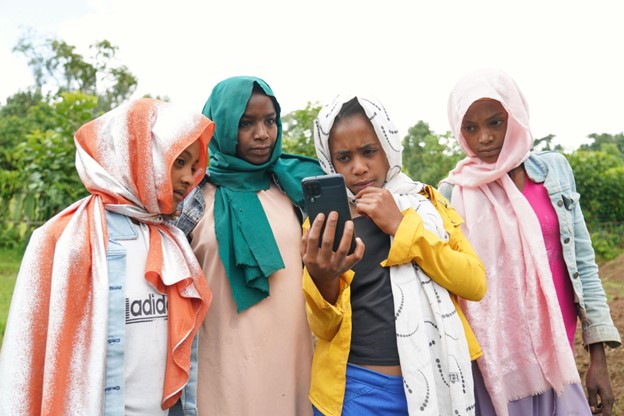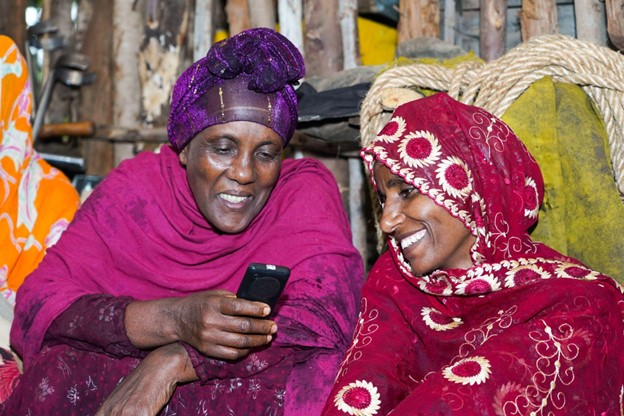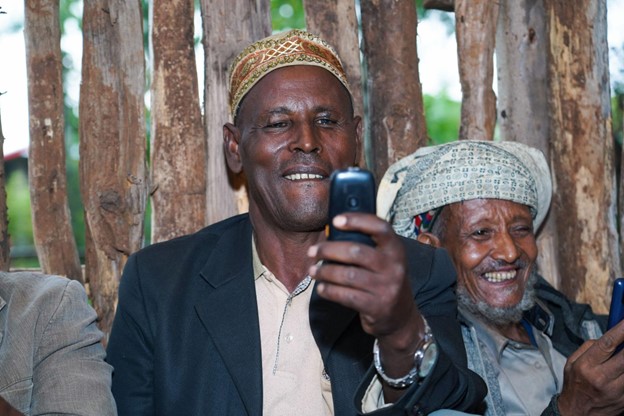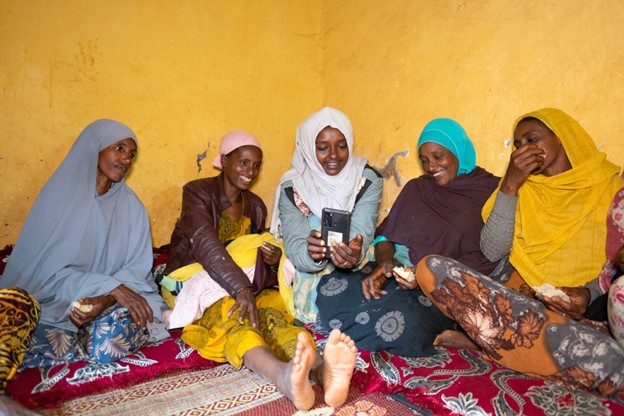

Bridging the Gender Gap in Agricultural Advisories: Insights from Farming Messages in Ethiopia
Building off a study conducted by IGNITE, led by 60 Decibels, Digital Green and Precision Development are working to effectively reach female farmers.
Agriculture is the backbone of Ethiopia’s economy, playing a pivotal role in providing livelihoods to a significant portion of the rural population and contributing substantially to the country’s GDP. However, smallholder farmers in Ethiopia face challenges, particularly limited access to improved technologies and crucial agricultural information. In recent years, digital innovations have emerged as potential solutions to bridge this knowledge gap and empower farmers with tailored advice. As a response to these challenges, the Digital Agricultural Advisory Services (DAAS) project was initiated in partnership with Digital Green, Precision Development (PxD), and the Ethiopian Government. The DAAS project aims to leverage Interactive Voice Response (IVR) technology to provide extension advisory services to farmers, harnessing the potential of mobile phones to improve their livelihoods.
IVR is a cutting-edge technology that enables automated interactions with users through voice prompts and keypad inputs. In the context of the DAAS project, IVR and video communication acts as a channel for disseminating tailored agricultural advisory information to farmers across Ethiopia. The DAAS project mainly focuses on two value chains, namely wheat and dairy. Farmers receive informative audio messages on various dairy practices, such as artificial insemination services, cow and calf management, improved husbandry practices, improved feed and feeding. The IVR platform facilitates convenient and accessible information delivery, as it requires no internet connectivity, allowing farmers in remote areas to access critical guidance through their basic mobile phones.

The Impacting Gender & Nutrition through Innovative Technical Exchange in Agriculture (IGNITE) is a technical assistance mechanism implemented by Tanager, Laterite, and 60 Decibels. It aims to identify models that demonstrate ways of increasing both the equitable consumption of affordable, nutritious diets year-round and the empowerment of women in agriculture. IGNITE conducted a study led by 60 Decibels to assess the effectiveness of advisory messages on dairy farming, delivered through Ethiopia’s farmer hotline IVR calls. The study focused on four respondent groups: male primary farmers, female primary farmers, female secondary listeners (who overheard calls on speakerphone), and female partial listeners (who dropped off calls before completion). By surveying 1,057 dairy farmers, the study explored listener profiles, the application and uptake of IVR information, household dynamics, decision-making power, impact on dairy farming, satisfaction levels, and challenges with the IVR call, particularly focusing on partial listeners and drop-off rates to better reach female farmers.
The Findings
The study revealed that, overall, listeners highly valued the convenience, ease of understanding, and usefulness of the information provided through the farmer hotline IVR calls. Farmers expressed a high level of satisfaction with the advisory messages, evident from the Net Promoter Score of 49 (in the top 40% of the 60 Decibels Farmer Benchmarks). Close to 8 in 10 farmers reported experiencing improvements in their quality of life, attributing these positive changes to the received dairy farming information. Improved cattle care, feed preparation, and feeding practices were among the top changes reported by farmers, indicating the tangible impact of the IVR calls on their way of farming and cattle management.
Key Gender Differences

Gender disparities were evident in the understanding, application, and uptake of advisory services. While all farmers acknowledged the usefulness of the information, female respondents reported some difficulty in comprehending and applying the shared knowledge. Only 7 in 10 female farmers applied the received information, compared to about 9 in 10 male farmers. Additionally, around 8 in 10 male farmers used artificial insemination services to obtain crossbred cattle, whereas only 65% of female listeners did the same.
The study shed light on decision-making dynamics within households, where men still control most of the decisions. While 4 in 10 female primary listeners held this role, 9 in 10 male primary listeners were the final decision-makers in their households. Female secondary listeners had minimal decision-making power, with only 1 in 10 solely making dairy-related decisions. Around 4 in 10 female farmers shared the device with other family members, in contrast to all male primary listeners who had their own phones, revealing the larger trend of the increased difficulty in reaching women. Interestingly, even though male primary listeners had slightly higher average cattle ownership, female listeners were more likely to report owning crossbred cows.
The study also highlighted partial listeners’ drop-off rates and their reasons for disengaging from the IVR calls. Women generally reported their main reasons for not completing the IVR calls included being at work, poor network connectivity, and language barriers. Interestingly, many requested calls to be scheduled post 5 PM, indicating a preference for receiving the information at a more convenient time.
Working towards Gender Parity

The DAAS project is committed to reaching more than 1.8 million farmers across Ethiopia with their advisory services, 40% of whom will be women. To achieve this ambitious goal, Digital Green and PxD are using the results from the study to implement new strategies to better reach female farmers. Even though women are actively engaged in dairy activities, their access to mobile phones in rural areas is not at par with men. DAAS has reinforced its commitment to reach female farmers through innovative and important steps.
In light of the study’s findings, PxD has taken specific actions to address the gender gap and enhance female engagement in their advisory services. It has embarked on a comprehensive data collection drive to obtain mobile numbers from 200,000 female dairy farmers in four regions. This data collection effort is crucial in enabling PxD to complete and schedule push calls specifically tailored to the needs and preferences of female farmers. Additionally, the study has prompted a shift in emphasis toward secondary listeners, namely farmers who engage with the IVR calls using loudspeaker options with their family members. This approach recognizes the importance of influencing household dynamics and decision-making processes by involving family members in the dissemination of advisory information.
As the consortium lead of the DAAS project, Digital Green has created a collaborative action plan with the PxD in accordance with the suggestions based on the research findings on the Dairy Farmers’ Experience with IVR Messages in Ethiopia. Digital Green is working on encouraging women with mobile phones to share the advisory content they’ve heard with other community members. Similarly, they’ll encourage male listeners to share the information with their spouses and family members, spreading the key information to a wider audience. The gender team at Digital Green is collaborating with partners to create, test, and analyze new messages promoting joint decision-making. They’re also working on weaving in video content to supplement the information shared through IVR Messaging.
Looking Forward
The DAAS project has made significant strides in providing personalized agricultural advisory advice to Ethiopian farmers through IVR technology. By leveraging digital tools and insights from research, the project has successfully empowered farmers to make better-informed decisions, improve their livelihoods and productivity. Investing in resources to better reach female farmers, this partnership holds the promise of transforming the agricultural landscape in Ethiopia.
